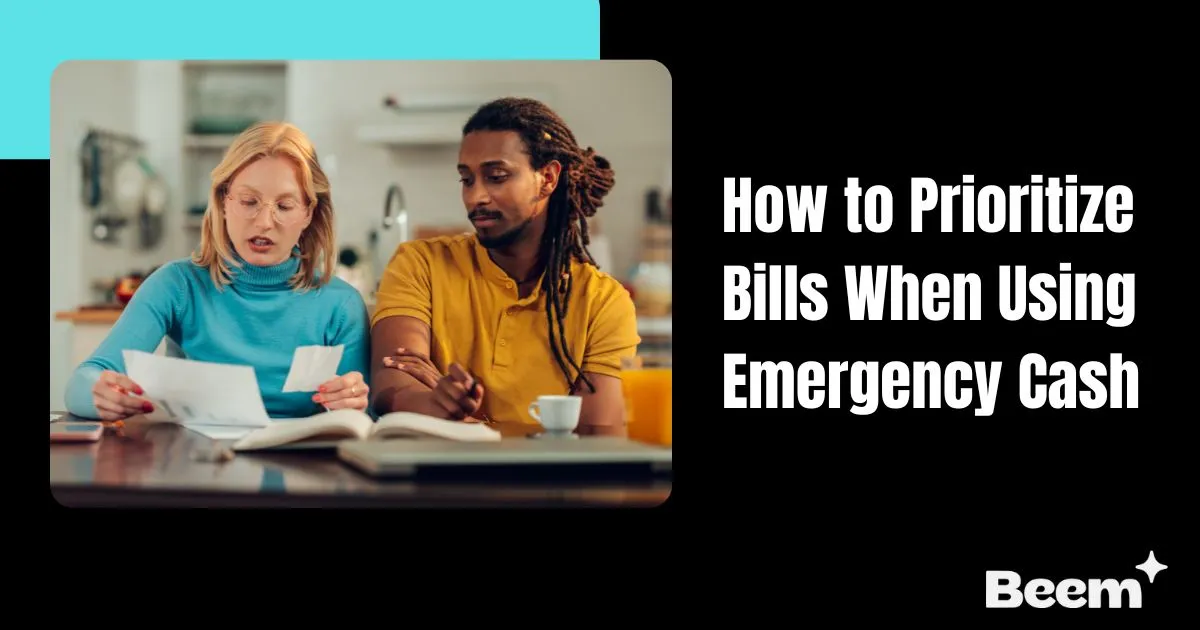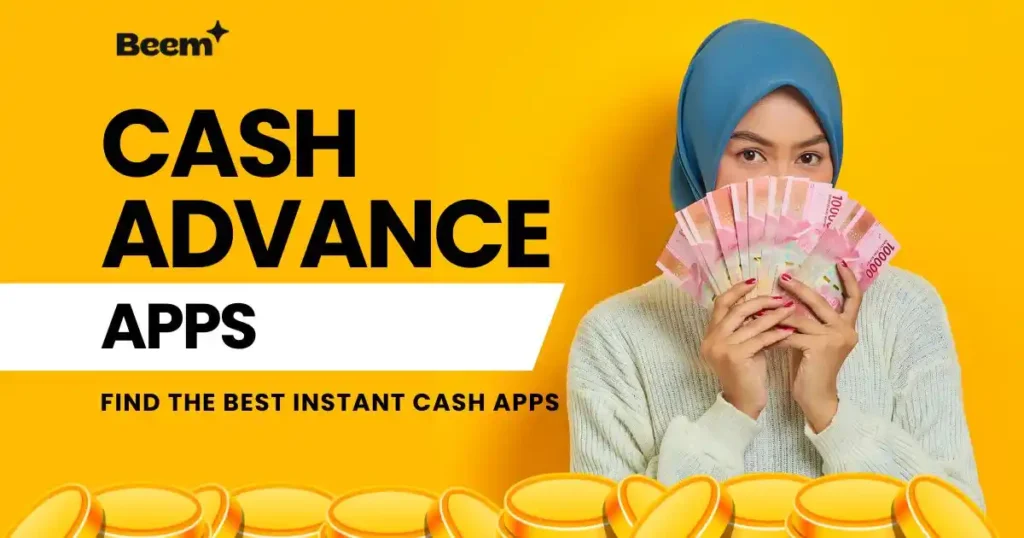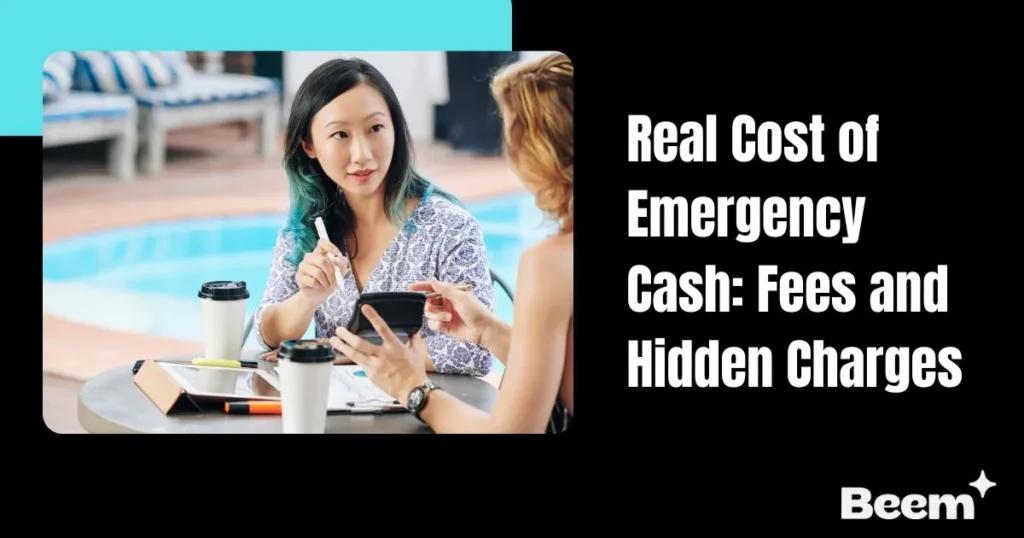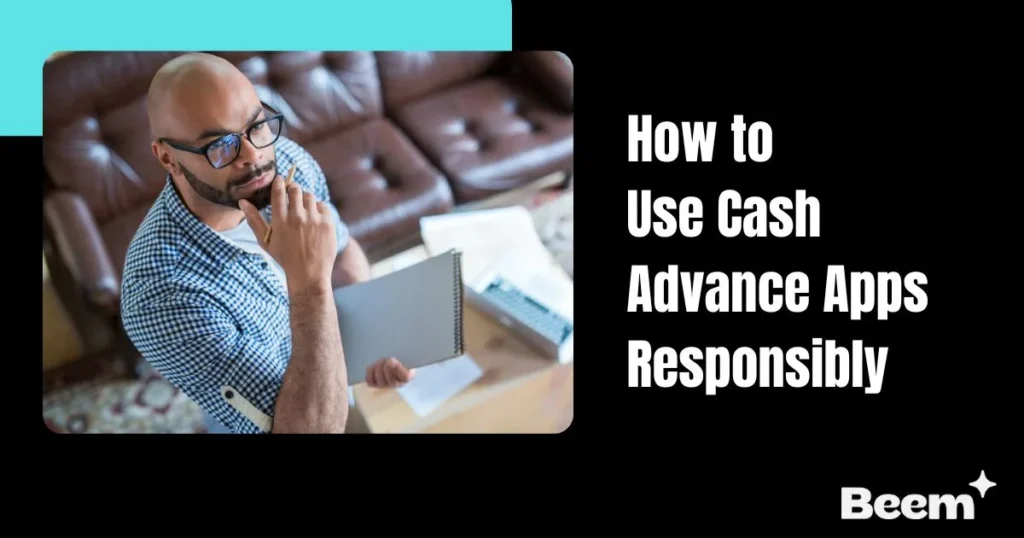At A Glance
Emergencies don’t wait — and neither do the bills. Financial shortfall can strike quickly, whether it’s a missed paycheck, unexpected medical cost, or sudden car repair. In these moments, many Americans turn to emergency cash advance apps like Beem to make ends meet. The next challenge begins once the funds hit your account: Which bills should you pay first? Let’s explore how to prioritize bills when using emergency cash.
By making informed choices, you can protect your housing, avoid utility shutoffs, keep working, and stay out of spiraling debt.
Why Bill Prioritization Matters in a Financial Emergency
Most people don’t have enough savings to cover even a $400 emergency. So when life hits you with back-to-back bills and limited cash, you must make tough financial choices.
Failing to prioritize correctly can have serious consequences:
- Eviction or foreclosure due to missed rent/mortgage
- Utility shutoffs for essential services like electricity and water
- Credit damage from missed payments or defaults
- Vehicle repossession, which may affect your ability to work
- Cascading late fees and overdraft penalties
The good news? A cash advance app like Beem’s Everdraft™ gives you immediate breathing room to protect the essentials, while smart budgeting tools help you avoid this scenario in the future.
Also Read: Emergency Cash for Travel Mishaps
Step-by-Step: How to Prioritize Your Bills
Step 1: Cover Survival Essentials First
Your top priority should always be the basics that keep you safe, sheltered, and healthy.
Focus on these bills first:
- Rent or mortgage: Missing housing payments can quickly lead to eviction or foreclosure.
- Utilities: Electricity, gas, and water are essential. Without them, living conditions can become unsafe.
- Groceries and household supplies: Stock up on basics so you’re not left without food, hygiene products, or medication.
Even if these bills aren’t the largest, paying them first ensures stability at home, which is critical during any crisis.
Step 2: Focus on Transportation & Work-Related Costs
Do you rely on a car, the internet, or public transit to earn a paycheck or attend school? If yes, then these expenses are next in line.
Examples:
- Car payments, gas, or insurance
- Transit passes or ride-share credits
- Internet and mobile phone — especially critical for remote workers or students
Protecting your income stream is key. Missing these payments can disrupt your earning ability and worsen your financial challenges.
Step 3: Make Minimum Payments on Credit Obligations
After covering the essentials, shift attention to minimum payments on credit cards, loans, and ‘Buy Now Pay Later’ (BNPL) plans.
Why only the minimum? Because it:
- Helps you avoid late fees and penalties
- Protects your credit score
- Keeps accounts in good standing without draining too much cash
Do not prioritize paying off balances in full during a crisis. That can wait.
Step 4: Delay or Negotiate Non-Urgent Bills
Some bills are important, but not urgent in a crisis. These include:
- Subscription services (Netflix, Spotify, apps)
- Entertainment expenses
- Retail payment plans
- Gym memberships
If money is tight, pause these expenses or contact providers for temporary hardship extensions or discounts.
Also consider:
- Calling lenders: Many offer flexible repayment during emergencies
- Exploring deferment: For student loans or secured loans
- Switching to pay-as-you-go plans: For phone or insurance bills
When to Use Emergency Cash from Apps Like Beem
Not every situation calls for a loan or advance. But if you’re facing an immediate, non-negotiable bill that affects your safety, stability, or work, you need a solution.
Common Scenarios to Use Beem’s Everdraft™:
- Received a final utility shutoff notice
- Missed rent deadline with eviction warning
- Can’t afford gas or transit to get to work
- Facing late fees or overdrafts days before payday
- Emergency groceries needed before SNAP or benefits reload
Beem’s Everdraft™ gives you up to $500 instantly, with no credit check, tipping, or subscription. It’s designed for real emergencies, not impulse spending.

Beem’s Everdraft™: Instant Help When You Need It Most
Beem’s Everdraft™ is more than a quick cash injection—it’s a tool to protect your financial foundation in moments of crisis.
Key Features:
- Instant access up to $500
- No interest, tipping, or hidden fees
- Zero impact on your credit
- No subscriptions or recurring charges
- 24/7 mobile access
You can split your advance across essential bills and use Beem’s budgeting dashboard to track how you’re spending it — all from one app.
Also Read: Using Instant Cash Advance to Pay Utility Bills
How to Rebuild After the Emergency
Once the immediate storm passes, it’s time to rebuild your financial safety net.
1. Review What Caused the Shortfall
Ask yourself:
- Was this a one-time expense or a recurring issue?
- Did your income change recently?
- Are your monthly expenses creeping higher than your budget?
Understanding the trigger helps you prevent repeat crises.
2. Build a Monthly Micro Emergency Fund
Start small — even $10/week adds up. Use Beem’s High-Yield Savings Account (HYSA) tools to:
- Create separate buckets (e.g., rent, utilities, car)
- Automate deposits based on income
- Track interest earnings and growth
3. Use Beem’s Budgeting Tools
Beem’s in-app tools help you:
- Monitor fixed vs. variable expenses
- Set spending limits
- View upcoming due dates
- Track past advances and repayments
This gives you a clear picture of your financial life and helps you avoid trouble.
Also Read: Instant Cash Advance for Medical Bills
FAQs on How to Prioritize Bills When Using Emergency Cash
What bills should I pay first with emergency cash?
Always cover the essentials first: rent or mortgage, utilities (like electricity and gas), basic groceries, and transportation to work or school. These are foundational to your safety and stability. Missing rent or power payments can lead to eviction or shutoffs, so prioritize those over less urgent debts. After covering the basics, consider your remaining obligations and allocate funds accordingly.
Can I use Beem to cover multiple bills?
Yes. Beem’s Everdraft™ is flexible, allowing you to split the emergency cash across multiple expenses. For example, you can pay part of your rent and phone bill and have enough left for gas or groceries. There are no restrictions on how the funds are used, so you can tailor them to meet your most urgent needs during a tight financial stretch.
Is it better to pay credit cards or rent first?
Always prioritize rent or housing-related costs first. Losing your home can create longer-term instability, while credit card payments, although important, can often be deferred or negotiated. Creditors may offer hardship programs or payment plans, but landlords or mortgage lenders are less forgiving. Use emergency cash to secure shelter and safety before managing unsecured debt.
Will using a cash advance app hurt my credit?
Not with Beem. Beem does not perform hard credit checks, doesn’t report your borrowing activity to credit bureaus, and has zero impact on your credit score. Whether you use it once or multiple times, your credit remains protected. This makes it ideal for users who manage urgent bills without damaging their long-term financial reputation.
How fast can I access emergency cash with Beem?
Beem typically disburses funds instantly after approval. The process is 100% digital — no paperwork, no bank visits, and no waiting for business hours. This means you can pay time-sensitive bills like rent or utilities immediately, even on weekends or late at night. Beem’s speed makes it a reliable lifeline when traditional funding sources fall short.
What if I still can’t pay all my bills after using Beem?
Focus on the most urgent essentials — like housing and utilities — and then contact your other creditors or service providers. If they learn about your situation, many of them offer hardship programs, grace periods, or payment deferrals. Beem is a helpful bridge, but combining it with proactive communication can help prevent additional fees, shutoffs, or collections.
Can Beem help me avoid late fees?
Yes. By offering instant emergency cash, Beem enables you to pay essential bills before deadlines hit. This can help you avoid late fees, overdraft penalties, and service disconnections. Even a small advance can be enough to stop a late charge or maintain service continuity, saving you more money and stress in the long run.
How do I plan better next time I run short on cash?
Use Beem’s built-in budgeting dashboard to track your monthly spending and identify areas to cut back. Then, open a High-Yield Savings Account (HYSA) through Beem’s partner network to begin building an emergency fund. Saving even small amounts regularly can help you reduce reliance on cash advances in the future and give you more control over your finances.
Can I get more than one advance from Beem per month?
It depends on your account activity, repayment behavior, and eligibility. Some users may be eligible for more than one advance in a month, especially if they repay on time and maintain consistent income patterns. Beem monitors your usage to offer responsible access to funds without overextending your financial limits.
Is Beem a good long-term solution for monthly bills?
Beem is designed as a short-term financial support tool, not a permanent fix. It’s best used to bridge temporary gaps or cover emergencies like unexpected bills, short paychecks, or missed income. For long-term stability, Beem encourages users to budget better, build savings, and reduce recurring reliance on advances through its financial planning features.
Conclusion: Use Emergency Cash Wisely — Protect What Matters Most
Financial emergencies can feel overwhelming, but they don’t have to take over your life. With the right plan and tools, you can make smart decisions under pressure and learn to prioritize bills when using emergency cash.
Here’s what to remember:
- Prioritize shelter, safety, and stability first
- Avoid long-term debt traps like payday loans or high-interest cards
- Use Beem’s Everdraft™ to bridge the gap safely and fast
- Combine emergency cash with budgeting and savings tools to regain control
Because staying afloat during a crisis isn’t about having more money — it’s about using what you have with clarity and confidence.
Any financial guidance goes a long way. Don’t forget to try Beem for more tips on improving your financial health, building credit, and discovering better alternatives. Download the Beem app here.






